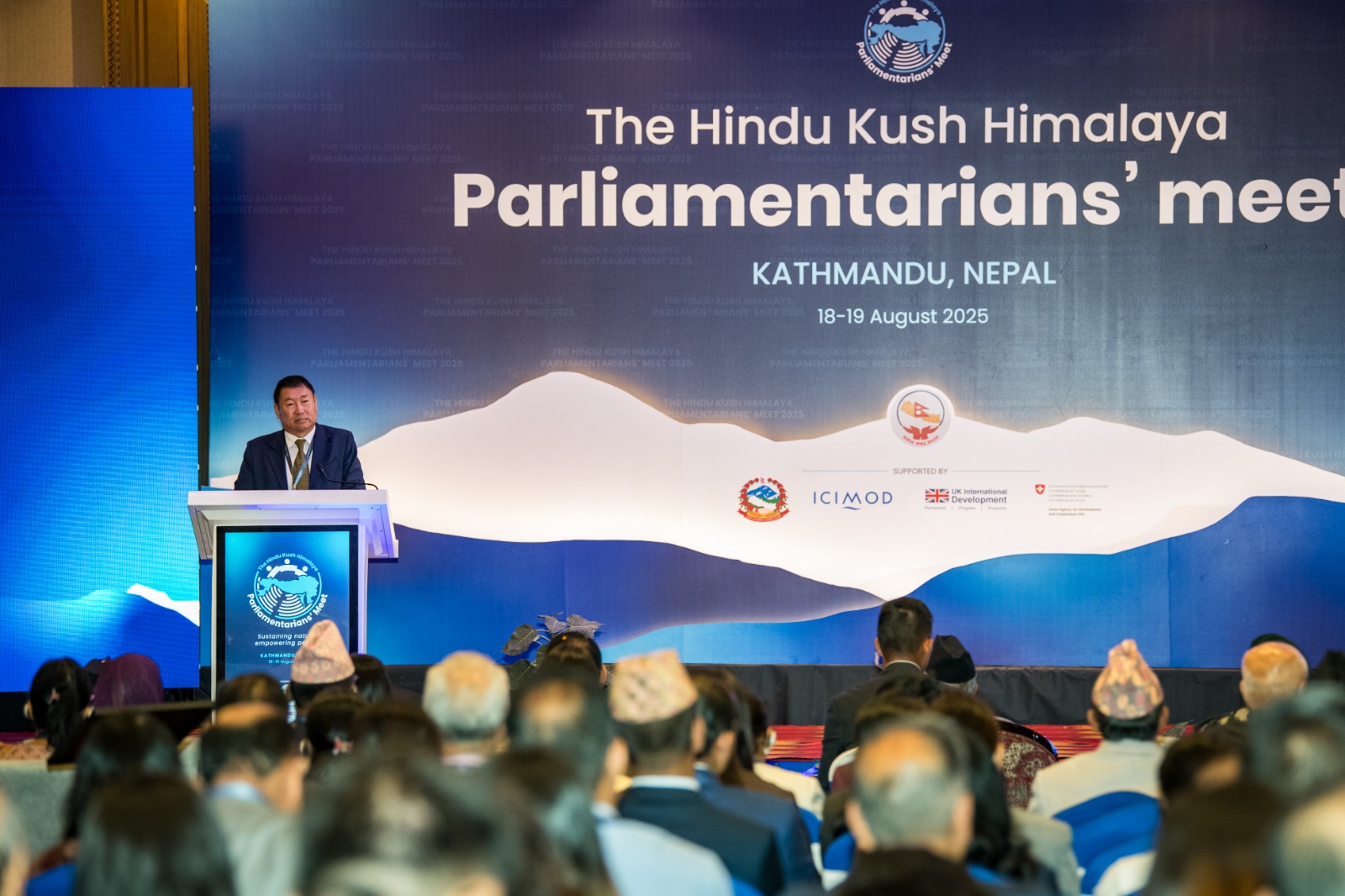
The Hindu Kush Himalaya is the ‘water tower of Asia’ and is often referred to as the Third Pole because it contains the largest ice mass outside the polar regions and is the source of ten major Asian rivers. The region supports the livelihoods of 240 million people living in the mountains, and further 1.65 billion people living downstream.
This means that almost one-fourth of humanity benefits from the HKH. However, our region faces accelerated impacts from the triple planetary crises – climate change, pollution, and biodiversity loss. Glaciers are melting faster than ever before. Together with other climatic events, we are facing a situation of either too much or too little water. Floods and droughts are often occurring at the same time in different parts of our region.
Glacier Lake Outburst Floods are increasing at an alarming rate along with extreme events like flash floods caused by cloud bursts and other extreme events. In terms of biodiversity, an estimated 70-80% of the original habitats are reported to be in degraded conditions not only threatening the survival of iconic species like Royal Bengal tiger and snow leopard, but also affecting the livelihoods of people.
Our region, particularly the Indo-Gangetic Plains and Himalayan Foothills is one of the most polluted regions in the world, with PM2.5 levels often exceeding 400 micrograms per cubic metre. This has serious impacts on our health, quality of life, environment, agricultural productivity, and the economy.
HKH is becoming an epicentre of multi-hazards with increasing vulnerabilities from geological, hydrological and climatic risks. Most of the challenges we face, disasters, air pollution, biodiversity loss, are transboundary in nature. And despite their global importance, mountain ecosystems remain underrepresented in national, regional, and international climate policies.
Existing frameworks often overlook the unique challenges and contributions of mountain regions, leaving them inadequately addressed in global environmental governance. Increasing losses and damage from climate-change-induced hazards and disasters have significantly increased the investment needs.
The HKH countries need around USD $742 billion annually for both adaptation and mitigation.
Evidence-based policies and legislations, innovative solutions, informed decisions, increased and targeted investments, and collaborative actions are essential for building resilience, prosperity, and sustainability in the HKH region.
As parliamentarians, your role as people’s elected representatives in enacting laws, influencing policies, reviewing development plans and allocating resources, and advocating for mass participation has never been more needed and crucial than it is now.
This historic parliamentarians’ meet has brought you all in the same room to discuss our shared challenges and most importantly to come up with shared solutions for the member countries of the Hindu Kush Himalaya.
Even more importantly, hon’ble members of parliament can contribute to building trust and confidence among our peoples and governments and strengthen collaboration and cooperation to move towards a more harmonious, prosperous, and safer region.
In this context, may I appeal to all that when it comes to climate change, we should not have any differences based on our political ideologies but speak with one voice. Similarly, our member countries should come together as one as climate change does not differentiate and affects every country. We may argue that this is a tall ask given the geo-political challenges we are facing. But what is the alternative to cooperation? The cost of non-cooperation is too great even to fathom.
ICIMOD, as a regional knowledge organisation, will continue to support its member countries by facilitating the sharing of knowledge, information and innovation in addressing the shared challenges of the region. We will also continue to advocate for mountain issues at the national, regional, and international levels. Let’s take this opportunity to strengthen collaboration among the countries of the Hindu Kush Himalaya to align our regional efforts with global climate goals.
Together we can build resilient ecosystems that support the well-being of our communities. We have the science, we have the data, we know enough to act now. What we need is an effective regional mechanism for taking collective actions.
It’s time for action – in our own countries as well as jointly as a region before it’s too late. This meet is a small step but as they say “the journey of a thousand miles start with a small step” it is a very significant first step.
(The article is the edited version of the statement given by Dr. Pema Gyamtsho, Director General, International Centre for Integrated Mountain Development, during the Hindu Kush Himalaya Parliamentarians’ Meet on August 18, 2025.)